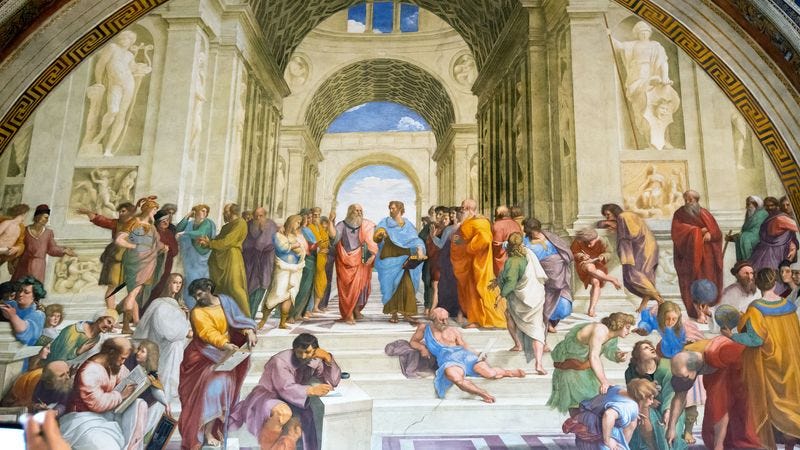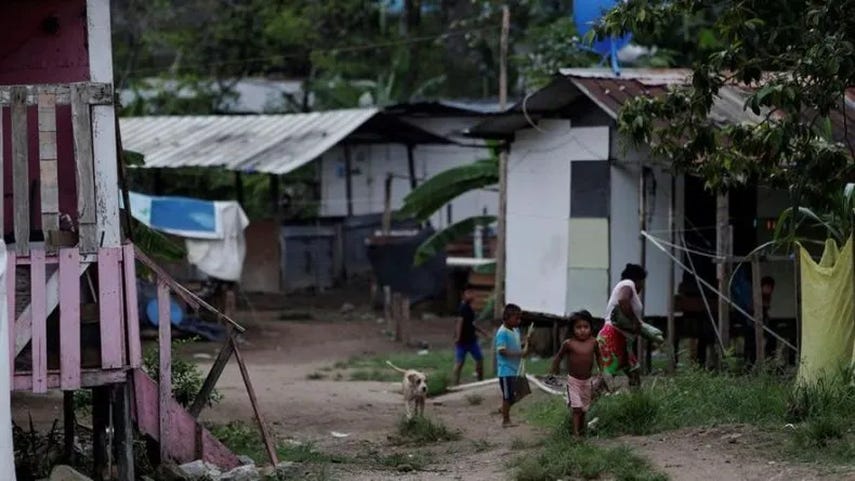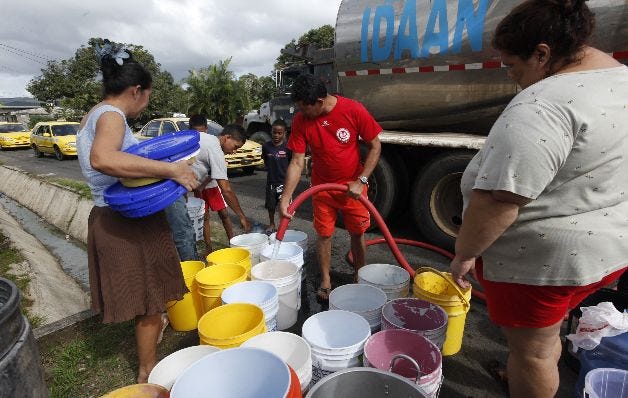Panama, Land of Opportunity: Broad middle class organization focusing on the political economy of all Panamanians
or "A few not-so-random thoughts on the hole we've dug ourselves into"
Versión original aquí.
The original version of this essay was published March 29, 2024 under the title “Panama, Tierra de Oportunidades: Asociación de clase media amplia con enfoque en la economía política de todos los panameños.” The translation has been edited for length.
The best political community is formed by citizens of the middle class. Those states are likely to be well governed in which the middle class is large, and stronger, if possible, than both the other classes — or at least stronger than either of them alone; for the addition of the middle class turns the scale, and prevents either of the extremes from being dominant.
- Aristotle, "Politics"Martin Wolf, chief economics commentator at the Financial Times, opens his latest book, “The Crisis of Democratic Capitalism,” with the quote above, and for good reason: a direct descendant of Holocaust survivors, Mr. Wolf is keenly aware how fragile “civilization” is, and knows perfectly well you cannot take life, let alone democracy, for granted. If you want a stable society, then, you don’t just need elections — which even Hitler won on his way to becoming Chancellor of Germany in the period between the two World Wars.
You need a strong middle class.
Panama’s economy, however, produces obscene levels of inequality and, therefore, remains highly unproductive, leaving regular Panamanians with little to no prospects for a better life. As we’re starting to see around the globe, the resulting precariousness makes our already fragile democracy vulnerable to populist appeals from authoritarians. Despite economic figures like GDP and FDI going gangbusters in the past several decades, Panama has completely lost any equilibrium it had regarding how the value extracted from its extraordinary resources was split amongst its population. Not that this ever existed in the first place, but today inequality is the worst it’s been, at least, in my lifetime.
For most Panamanians, the main problem is simply making it through the week without another unexpected hit to their already unstable finances — no matter how hard they work or how much they sacrifice. Specifically, two things make life much more frustrating than it needs to be for the vast majority of Panamanians, regardless of where they fall on the political spectrum or how they “identify”.
A captured and hence corrupt and highly inefficient state, which imposes all kinds of costs on its citizens: financial, bureaucratic, and psychological.
A political economy that DOES NOT reward investment in human capital, because the most powerful players, foreign and domestic firms alike, make their money by extracting value from state resources, instead of creating it.
Most Panamanians are literally stuck with a government that charges them for basic services it fails to properly deliver, and an economy where the biggest and basically only winners don’t really need anyone else to win — but thanks playing! In Panama, as those who actually hustle have been learning the hard way for the better part of a decade now, it’s easier to get rich off a government contract, or a financial asset, including real estate you’re not even using, than by creating something useful, such as a startup or an in-demand service at competitive prices.
By capturing the state, a handful of local corporations — mostly intermediaries (middlemen and women) who create little to no value — dominate more and more of the country’s political economy. Hence, what need do they have for healthy democratic institutions? Or a highly-skilled, well-educated population? As long as these groups keep the power to write in their favor the rules of the game — otherwise known as “maintaining the status quo” — they simply could not care about much else. Not because they’re “bad people”, mind you, but because capital and citizens, very often, have conflicting incentives.
And yet this imbalance has, after generations and a string of very lucky breaks, finally reached its breaking point. State capture by large concentrations of capital has gone from economic handicap to known (social) carcinogen. Latin America has given us plenty examples of this throughout history — though, lately, it seems the rest of the world is aping the region’s traditional politics. Unfortunately, like those of humans, political bodies can also develop deadly tumors in which a handful of individual cells grow outta control, effectively choking off the rest of the body’s organs.
It’s way too easy to get distracted
We talk a lot about inequality these days, though certainly not nearly enough, but what we rarely talk about is cui bono — who benefits? — from the system remaining unequal and, seemingly, rigged from the start. We talk even less about how Panama’s great material imbalance poisons society: our public discourse, our sense of national unity, and, most importantly, our ability to trust each other.
Average Panamanians might not have the vocabulary for it, but they certainly feel it: in the mortgage, car, and insurance payments (among others) they can’t make on time or at all; in the public school that doesn’t teach their kids squat — and might even harm them; in the government-run hospitals suffering shortages or killing patients with tainted drugs from China; and/or in the “white-collar” job that barely covers groceries.
But instead of facing these issues head on, we get caught up in “hot-button” topics that actually are quite separate from the daily lives of most Panamanians. Gender equity/parity gets plenty of attention, for example, but the gap between men and women of the same social stratum is nothing compared to the chasm between wealthy ones, on one hand, and all “other” Panamanian women, on the other. The real issue has never been legality, of course, but access, including to an abortion, supposedly outlawed in Panama. A woman with means can always find a safe and discreet “black market” procedure locally, or simply buy a plane ticket somewhere it’s legal and walk into a doctor’s office to get it — like most of the civilized world does (with some restrictions, clearly).
Most women in Panama, though, don’t have anywhere near that choice, or freedom. If they get pregnant, purposely or not, they’re having that baby and taking care of it, many times on their own, even if it kills them — or even if they’re 8 years-old and carrying another child only because a family member raped them, liked happened here just a few years ago. Yet we forget that stuff like this happens in Panama regularly.
The same is true with LGBTQ rights. Most likely, if a gay man or woman ran for office in Panama today, their sexual orientation would most certainly be “used against them”. But they might very well still win, especially with support from younger voters. The realest problem facing most gay Panamanians today isn’t marriage equality, though, it’s the cost-of-living crisis, same as everyone else! It’s getting a job that pays a decent wage, as well as the expensive training said job usually requires. It’s keeping your family safe and sane and afloat in a country whose civil servants take special pride in making life miserable for average citizens — or, for a large chunk of change, making all their problems go away — gay, straight, or bi.
Inequality, in essence, is about life outcomes, whether or not the country you’re born in gives you a real shot, if not at success, at least at dignity. But when your life chances are still — even after 120+ years of independence — mostly determined by your last name, or the hospital you were born in, you can’t expect the rest of the population to just keep eating shit like that, day in and day out.
These outcomes, contrary to our deeply held believes about human agency, are by far a result of our political economy, specifically, the way the Panamanian State has allowed a handful of groups — mostly large multinationals, as well as the legal, financial, and political intermediaries they so gainfully employ — to control and privatize the benefits of Panama’s vast public resources. And I’m not just talking about our mineral deposits or Canal, even. I’m talking about all our critical infrastructure, including its geo-strategic position on the world stage.
And not just physical infrastructure, mind you, like our landmass, coasts, and yes, the Canal, as well as road networks, ports, airports, and utilities — but our legal framework, too, aka the laws of the Republic. None of these were created solely (or even mainly) by private individuals, nor for private gain. They’re resources belonging to all Panamanians, but only a select few individuals or clans get to profit off them, as if they were their personal property — part of their fiefdom.
A Call to Collective Action
Therefore, just as the great moral crusade of nearly all Panamanians, from “independence” in 1903 until September 7, 1977, was the recovery of our sovereignty and our principal resource; and, just as a decade later it was the fight against the military dictatorship that ended up ravaging the nation; the task now falls on the current generation to rescue our captured state — especially younger Panamanians who will inherit the catastrophe we are leaving them, while extracting value from the country and recklessly burdening it with debt.
Namely, we must take back control of all our national resources which, like the Canal before it was fully returned to Panama, have been exploited mostly by entities foreign to the vast majority of the population. In this regard, it’s worth remembering our country’s resources include (but are not limited to):
Natural Resources
Commodities — like the copper that First Quantum Minerals (FQM) seeks to extract from our subsoil, which they will surely do if another one of our traditional (read: easily corrupted) politicians becomes president.
Our geographic position, which benefits numerous companies that fail to compensate the state adequately, or at all, for this one-of-a-kind advantage, including those of the Colon Free Zone and other “duty-free” zones, logistics parks, etc. Since their profitability stems directly from their location in relation to the Canal and our ports (also state resources), these private entities, which have been granted all kinds of special privileges under the law, would be far less profitable — indeed, most wouldn’t even be economically viable — if located not just in another country, but simply in another Panamanian province.
Land, most of which can and should be treated as private property but, by its limited nature — they're not making any more of it, unfortunately — should be subject to a yearly tax on its market value, say 0.2% (only on the land’s value and not on any of the built environment on top, which is actually created).
Physical Resources
The Canal, under our full control since 2000 via the Panama Canal Authority (ACP), thanks to both good luck (see Jimmy Carter) and collective action of a great many groups of Panamanian citizens — both political and from civil society — over several generations.
Our seaports on both coasts, especially the two most important ones, controlled by CK Hutchison Holdings Ltd. Through its local subsidiary, Panama Ports Company (PPC), this Chinese holding company operates the Balboa and Cristobal ports under a state concession. During its first 25 years, the company paid just $8 million to the government (not even $900 a day). Naturally — because this is Panama — the concession was renewed by the previous administration, under then President Nito Cortizo, for another quarter century without any changes to it whatsoever.
Airports, especially Tocumen International (PTY), the Hub of the Americas, one of Panama’s most valuable assets — basically, another canal but for travelers across North, South, and Central America and the Caribbean, instead of cargo across the oceans. For decades now, Copa Airlines (NYSE: CPA) has had a monopoly on the use of PTY as an airbridge (to connect passengers via Panama). Outrageously, Copa competes, very profitably I might add, with most regional airlines thanks to its exclusive use of the country’s main airport as a connections hub.
Social Resources
Panamanian Law, especially our Corporations Law, used for profit by local lawyers selling “asset protection” — as well as by the banks that finance the construction of these duly-protected, USD-denominated assets. You can see it from practically anywhere in the capital at night: massive concrete towers with only a few apartments illuminated (occupied), monuments to waste and indifference taking up some of the best real estate in Panama City.
Also worth mentioning specifically is our tax code, in particular the laws that enable perfectly legal tax evasion, primarily for foreigners. This is the main reason Panama gets placed on all kinds of international black and gray “lists”, which prevent a huge class of capital (mostly legal, above-board) from being invested here, hence drawing even more speculative real estate deals, i.e. the least productive type of investment.
Panama’s current reality, in which a devastating amount of what even the most hardcore libertarian would call state resources, is controlled by a few small groups — in collusion with the politicians who write the rules of the game — is unsustainable, destabilizing, and in general just maddening, especially for most citizens who, in relative terms, receive almost nothing from what was bequeathed to us by Providence, God, or whatever higher power you believe created the universe — and to our small strip of Central American isthmus. If this hadn’t been the case, it would be us Panamanians dying like dogs in those “caravans” headed North, like the rest of the Central Americans who weren’t as lucky.
The illusion of prosperity
During the 2000’s and 2010’s, immense amounts of capital were injected into the Panamanian economy. Starting with the slow collapse (then violent crash) of Venezuela — and alongside biblical levels of public disbursement, via sovereign debt, to expand the Canal and thus stay relevant in the global economy — billions of Venezuelan bolivares, when they were actually still worth something, came into the country via our so-called “international services platform”.
Launched during the military dictatorship to “sell Panama” — as so many of its brokers like to say — these legal and financial services were used by “the generals”, as well as by many local “businesspeople”, to allow Colombian cartels, among other criminal enterprises, to “invest” billions in the country in the 1980’s and ‘90’s, mostly in brick and mortar laid by Suntracs, the now hugely powerful, often violent construction workers union.
This economic activity — aka being a tax haven — has to this day been phenomenally lucrative for a handful of companies and, to a lesser extent, for unionized construction workers. For anyone who’s not a part of this de facto state-subsidized industry, however, the racket just raises the cost of living, and it’s regular Panamanians who must pay the myriad externalities of all these real estate “deals” — the euphemism economists use for business costs that aren’t paid by those who profit from the business.
One of those costs, clearly, is inflation, probably the most destabilizing force any nation can face. As we’ve seen since public spending took off after we got the Canal back, our underdeveloped economy still cannot properly absorb foreign capital without triggering price hikes in practically everything. This is due, above all, to the fact that Panamanians are quite inefficient, thanks mainly to the public policies of every government, military or civilian, since I can remember.
But it’s the resulting political power of the intermediation industry that has enabled the capture of the state by, among others, the banks and law firms that make up this platform, particularly so that those receiving these capital flows may keep the majority of the value extracted from them, while most Panamanians remain outta the loop, to say the least.
Despite harming them dearly, little from all this “investment” goes to salaried workers, local entrepreneurs, and small and medium-sized firms, however, which is why they need to organize. Not just to push for their quite specific interests — many times, contrary to those of these intermediaries — but to serve as a counterweight for their power. Except for political violence, this is the only way to get back control.
This, in essence, is Panama, Land of Opportunity, or Panama, Tierra de Oportunidades (PTO). In a few days, I’ll lay out a handful of concrete public policy proposals to begin bringing back at least a semblance of balance for the people who live, work, and actually try to build something in this country.










